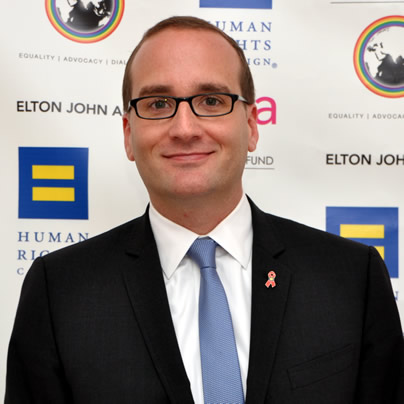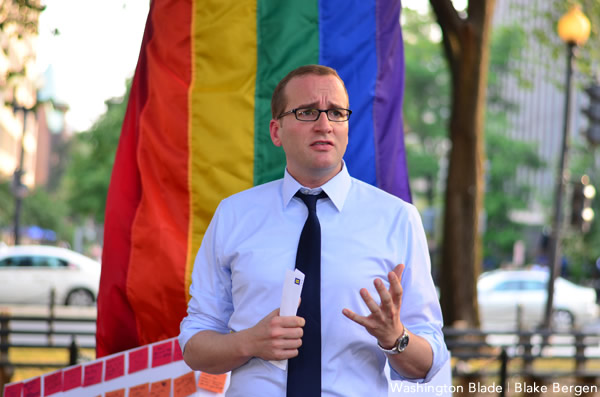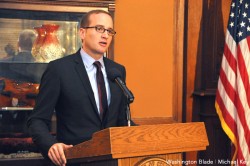National
HRC president on the road ahead for LGBT movement
‘You don’t give up anywhere, and we’re going to have opportunities everywhere’


Human Rights Campaign President Chad Griffin sees progress on ENDA and marriage equality ahead. (Washington Blade file photo by Blake Bergen).
From advancing marriage equality to building support for the Employment Non-Discrimination Act, Human Rights Campaign President Chad Griffin sees significant progress ahead on LGBT issues across the country.
Immediately after the Senate committee vote Wednesday in favor of ENDA, Griffin spoke with the Washington Blade about moving forward in the aftermath of the historic vote and the U.S. Supreme Court decisions two weeks earlier in favor of marriage equality.
Griffin also talked about the Southern tour on which he’s embarked — in particular his visit to his home state of Arkansas — which he said is an attempt to reach out to LGBT people away from the coasts to ensure progress reaches them.
“If you look at the map of equality right now, you’ve got the coasts — largely, not completely — colored in, and then you’ve got everything in the middle with two little amazing dots that I’m really proud of: one in Minnesota, and one great Supreme Court decision in Iowa, ” Griffin said. “But the rest of this country has to be colored in as well.”
Arkansas was also an important stop for Griffin because Sen. Mark Pryor (D-Ark.) is one of three Senate Democrats who have yet to sign on in support of ENDA. Griffin emphasized poll numbers showing 61 percent of Arkansas resident support a transgender-inclusive federal law protecting workers against discrimination.
“Sen. Pryor is a key vote, and Sen. Pryor has yet to announce his position on ENDA, and it’s important for him to hear from Arkansans, for him to hear from folks all over the state on why this is important to them,” Griffin said.
Asked whether a discharge petition would be an appropriate course of action for ENDA in the House, Griffin said, “I don’t know the answer. I think as we get closer and as we make progress in the Senate, we’ll see, as we get closer, what the right strategies will be ultimately to get this done.”
Griffin also identified LGBT youth homelessness as an issue that doesn’t get enough attention in the media compared to others like marriage equality — noting 40 percent of homeless youth in Salt Lake City identify as LGBT.
“Just yesterday, I was talking to a number of folks in North Carolina about the homeless youth issue, and the issue of homelessness,” Griffin said. “There are a number of ways to combat that problem. One of them is direct service providing and the need for public funds to do that.”
The full transcript of the interview follows:
Washington Blade: What do you hope to accomplish during your Southern tour?

Chad Griffin at the ceremony for the signing of the D.C. anti-bullying bill. (Washington Blade file photo by Michael Key)
Chad Griffin: Look, I said this the moment I walked down the steps of the Supreme Court, and then I said it on the phone with the president about 10 minutes later that there’s certainly a moment of celebration. We have to acknowledge the historic significance of those two decisions, of the fact that two of the grandest symbols of discrimination in this country — in many ways, quite frankly, around the world — were struck down by the Supreme Court, and, with that decision, thousands upon thousands, and ultimately millions of people are going to be treated more equal, and with dignity and respect.
Families are going to have protections that they didn’t have before, and we doubled the number of Americans in states with marriage equality, which is incredible. We went from 14 percent to 30 percent.
But the moment you finish those words, you immediately have to pivot to the 37 states that didn’t feel the reach of justice by those decisions. Now, they provided great help to the young person who was able to see on TV, and read on the Internet and Twitter and so forth — it gave great hope and it said some day, those people are going to grow up with the same hope, dreams and aspirations. But in 37 states, they didn’t feel the reach of justice.
… That night, I never went to bed. I was on a 6 a.m. flight to Salt Lake City the very next morning. The Thursday morning after the decisions to highlight just that. And that’s where we have to work, and have to organize like we’ve never organized before, and work harder than we’ve ever worked before in states across this country. Because if you look at the map of equality right now, you’ve got the coasts — largely, not completely — colored in, and then you’ve got everything in the middle with two little amazing dots that I’m really proud of: one in Minnesota, and one great Supreme Court decision in Iowa.
But the rest of this country has to be colored in as well, and that’s why I’ve been meeting with folks — in Arkansas, in particular. We released a bipartisan poll — I assume you know about that — that’s incredible. All the focus is always on the national numbers, and where the movement is, and whether we’re 56 or 57 or 55, whatever national poll you look at. But in Arkansas, we’re almost 40 percent in support of marriage equality, and for those under 30, we’re at 61 percent in support for marriage equality.
And then, in that state in particular, we highlighted the ENDA numbers. Over 60 percent of Arkansans support a fully inclusive Employment Non-Discrimination Act. And that’s an important message to get out. … We did two events. The first one, we had about 400 people. The next one, on the same day, about 300 people. I met with folks in Hot Springs a couple days before that when I was with my family.
But Sen. [Mark] Pryor is a key vote, and Sen. Pryor has yet to announce his position on ENDA, and it’s important for him to hear from Arkansans, for him to hear from folks all over the state on why this is important to them.
I then went to North Carolina, and, unfortunately, Sen. Burr voted via proxy, he wasn’t here today, via proxy “no.” But I think that you give up on no one. We still have several weeks, and months, to work before this on the Senate, and I think we don’t give up on anyone. There were a lot of folks who were surprised by the bipartisan votes that came out of this markup this morning. And I’m optimistic that we can have more Republicans and undecided Democrats join us. And that’s why I’m spending time in these states, so that these folks can hear from their constituents, and can hear from them in loud and bold ways.
And for us to really begin, and for me to spend time, quite frankly. In my first year, I think I’ve been to 23 states, and it’s time to spend a lot more time in the states, like Arkansas, my home town, where I grew up my entire life, where my entire family still is. And Arkansas looks a lot like the other 37 states.
Blade: What do you think are the most immediate prospects for marriage equality in those remaining 37 states?

(Washington Blade file photo by Michael Key)
Griffin: Well, like I said, it took us less than five years to take down Proposition 8 from the day it was passed. I think within these next five years, and I think it’s an important goal to set that we, as a community, can bring marriage equality to all 50 states within five years. And there a number of opportunities. There’s no silver bullet that goes from state to state. It’s very different in the states.
In a state like Illinois, we have all been organizing in a great coalition of in-state organization and national organizations like the Human Rights Campaign, Lambda, the ACLU and HRC. We’ve had, I think, 15 field team members on the ground there for months. That legislature should have already passed it. I think, very soon, it will.
In Oregon, there’s a ballot opportunity coming up where we also have folks on the ground and strong chapters. In Nevada, we have real opportunities there. It’s a bit more of a complicated process with two legislative votes, and then a public vote, to make progress. It’s the only state, I think, by the way, that’s like that.
And then, there are other states that, I think, where opportunities are going to present themselves. There are states — people were shocked that opposition to marriage equality was 55 percent. “55 percent? That means you’re losing!” Yeah, but look at the movement each year. Well, in two years, in three years, in four years, I don’t know how many years that is, we’re a few years away from crossing the 50 percent point in a state like Arkansas.
So, I really think that you don’t give up anywhere, and we’re going to have opportunities everywhere. Now, at the end of the day, just like in the civil rights movement in the ’50s and ’60s, there are going to be states that, unfortunately, the electorate might move, but elected officials might not in some of the places. And, I think, ultimately, they will regret it as most of them did during the civil rights movement, and for those states, it will take another federal court decision.
And I suspect, you’ve already seen several announced, I suspect you’ll probably see dozens in the months to come, as legal organizations as well as just everyday folks filing lawsuits with the momentum they saw out of those decisions.
What’s important is that we’re strategic and smart in all those ways, but what’s also important [is] that we acknowledge what might have been impossible just a few years ago, is perhaps possible today. You know, and as it relates to the Prop 8 case, there were a lot of folks that thought that wasn’t possible and thought that Justice [Anthony] Kennedy would never be there on issues like equal protection today, and argued for waiting a long time. What we saw was the courts catching up with public opinion, and so ultimately, there will be another federal court case or multiple ones that reach the Supreme Court, and that’ll just decide this for the states that don’t move along.
But our job, in the interim, is to move equality forward, where we can advance marriage equality. We need to advance it in all these different ways, continue to change more hearts and minds where we can move forward with employment non-discrimination. Statewide we need to do it. And where we can’t get it statewide, we need to move it at the municipal level in cities and in counties — again, depending on the state, how you can move it forward.
A state like Utah, I think, to date, the number is like 18 municipalities in Utah. There are no statewide protections. but there are 18 cities in Utah that have such protections. My home state of Arkansas has none, has zero protections. Hopefully, some day, in a state like Arkansas, we can move forward on employment protections statewide, but in the meantime, I think it’s an example of a place where we make progress at the city level in a number of places.
Blade: Getting back to ENDA, today we had Hatch and Murkowski voting in favor of it. Did those votes surprise you?

Griffin: I have to say when it comes to issues of equality, nothing surprises me when it comes to Democrats and Republicans on this issue.
The most recent poll shows 9 out of 10 Americans have someone in their close immediate family circle, or close friend circle, that’s LGB or T. And all of the research shows that when you know us, you don’t hate us, you don’t wish less than, you don’t wish upon your loved ones to be treated as less than you, and you don’t wish for them to be intentionally harmed, and, I think, that is a key reason that Democrats and Republicans alike are evolving on these issues. Folks in both parties, but it was particularly significant today that we came out of this markup for those three Republicans joining those Democrats.
I think it’s also important to note that there was also one Republican here who actually voice-voted “no,” and then was the proxy for the other “nos.” But none of the other “nos” were actually even in the room. It’s incredible progress. We’ve seen the incredible bipartisan progress on marriage equality, today we saw bipartisan progress as it relates to ENDA, and I think this is only going to continue.
Our job is to continue to organize to continue to increase the pace of this bipartisan progress, and to ensure that when we get to the Senate floor, we’ve done everything we can to ensure that these senators have heard from their constituents back home, and that they know that this is not a partisan issue at home, and that they know that it’s an issue of basic human dignity.
It’s, quite frankly, the most conservative of issues — basic human dignity, treating everyone equally under the law, hiring them based on their qualifications, keeping them based on their job performances, not based on who they love, how they were born. And so, I’m so excited to sit here today and see the bipartisan collaboration.
But we have to acknowledge we still have a long ways to go. This vote today does not mean this bill is done. It means we’re coming out in a good way, but we’ve got a lot of work to do to push this across the finish line: both in the Senate to get 60 votes, and then we move to the House of Representatives.
Blade: What are some of the details? How are you going to get there? How are you going to achieve that?
Griffin: Well, we’re already doing it, and I said, the examples I gave, we’re organizing in states where we have …targeted votes. Arkansas being an example, and Utah being another example, and Alaska being another example.
[To HRC Legislative Director Allison Herwitt]: Feel free to add here. I didn’t sleep last night. North Carolina? I’ve already told him about that one.
Blade: In the House, do you think a discharge petition would be a good way to go to move forward?
Griffin: I don’t know the answer. I think as we get closer and as we make progress in the Senate, we’ll see, as we get closer, what the right strategies will be ultimately to get this done and work with the leadership, and work with Leader Reid and Chairman Harkin, who have been instrumental, and Sen. Merkley, who have been instrumental in getting us to where we are today. And we’ll work closely with them and take direction from them in terms of the best way to advance this and come up with a law that the president can sign.
Blade: You talked a lot about marriage and ENDA. What LGBT issues aren’t getting enough attention in the media?

(Washington Blade file photo by Michael Key)
Griffin: Well, look, I never think enough attention can be given to an issue when there’s so much harm done every single day, and I always go back to the young people who suffer day in, and day out because of inequality. There are the laws that impact, and the laws that should be providing protections to them and to their families, but there’s also the bigger impact of those laws giving license to discriminate.
Just yesterday, I was talking to a number of folks in North Carolina about the homeless youth issue, and the issue of homelessness. There are a number of ways to combat that problem. One of them is direct service providing and the need for public funds to do that. But it’s such a disproportionate number of LGBT youth that are homeless.
In Utah, the day before I started this job, I spent a good portion of the day at a homeless shelter, not an LGBT homeless shelter, a homeless shelter. Forty percent of homeless youth in Salt Lake City identify as LGBT. So there’s a lot of work to do there. But you also have to go to the root of the problem of why are these young people homeless, and it’s often two answers. One, they come out of the closet, and their parents reject them because they’re either told by the government, or by their church, that their children are less than and they should be rejected.
Or, often times, the case is they do come out. Young people increasingly have the courage to come out, and then their families reject them and kick them out of their homes, and young people travel to the closest city they can get to where they have a shelter.
So, I don’t want to insinuate that that’s the only issue that should be getting more attention because there are many issues that should be getting more attention both from the media, and public funding and financing, and legislatively.
But we have a long ways to go, and I think, the important point with the question you ask is there are a lot of celebrations over these last two weeks, and it is important finally to celebrate when we’re having some major achievements. You have to be able to celebrate, but you also have to immediately be able to turn the corner and pivot, and acknowledge the road ahead.
Blade: You’ve been on the job at HRC for just more than a year now. Has anything come up over that time that has surprised you, that came up that you didn’t think was going to happen?
Griffin: Look, I’ve been in Washington long enough before I started this job that it’s sort of difficult to surprise, but, I guess, what moves me the most is meeting the thousands and thousands of people. Like I said, I was probably with 800,000 people in Arkansas in a 24-hour period. I venture to say it was 60 percent LGBT folks and 40 percent straight allies who showed up because they cared and they want to advance equality. Those are the folks that are good reminders every single day of why we fight this fight.
In this town, we so often get caught up in the partisan and political bickering, and it’s important for all of us to spend as much time as we can outside this city, So, I guess perhaps, I don’t know if surprise is the right word, but certainly the most gratifying part of this job is getting to spend time with those folks that need equality the most.
U.S. Military/Pentagon
Air Force rescinds rule barring inclusion of preferred pronouns in email signatures
Conflict with language in military funding package may explain reversal

The U.S. Air Force has issued a “directive to cease the use of ‘preferred pronouns’ (he/him, she/her, or they/them) to identify one’s gender identity in professional communications,” according to a report published in the Hill on Wednesday.
The rule, which applies to both airmen and civilian employees, was first adopted on Feb. 4 pursuant to President Donald Trump’s anti-transgender executive order called, “Defending Women from Gender Ideology Extremism and Restoring Biological Truth to the Federal Government.”
Days after the administration’s issuance of that order on the first day of the president’s second term, the Office of Personnel Management instructed agencies across the whole of the federal government to remove pronouns from email signatures and enforce the policy barring employees from using them.
Additionally, on Jan. 27 Trump published an order barring trans people from joining the U.S. Armed Forces, indicating that those who are currently in serving would be separated from the military. The Pentagon is fending off legal challenges to the ban in federal courts.
Particularly given the extent of the new administration’s efforts to restrict the rights of trans Americans and push them out of public life, the Air Force’s reversal of the pronoun guidance was surprising.
According to reporting in Military.com, the move might have come because officials concluded the rule was in conflict with language in the military appropriations funding legislation passed by Congress in 2023.
The NDAA established that the defense secretary “may not require or prohibit a member of the armed forces or a civilian employee of the Department of Defense to identify the gender or personal pronouns of such member or employee in any official correspondence of the Department.”
The White House
USCIS announces it now only recognizes ‘two biological sexes’
Immigration agency announced it has implemented Trump executive order

U.S. Citizenship and Immigration Services on Wednesday announced it now only “recognizes two biological sexes, male and female.”
A press release notes this change to its policies is “consistent with” the “Defending Women from Gender Ideology Extremism and Restoring Biological Truth to the Federal Government” executive order that President Donald Trump signed shortly after he took office for the second time on Jan. 20.
“There are only two sexes — male and female,” said DHS spokesperson Tricia McLaughlin in a statement. “President Trump promised the American people a revolution of common sense, and that includes making sure that the policy of the U.S. government agrees with simple biological reality.”
“Proper management of our immigration system is a matter of national security, not a place to promote and coddle an ideology that permanently harms children and robs real women of their dignity, safety, and well-being,” she added.
The press release notes USCIS “considers a person’s sex as that which is generally evidenced on the birth certificate issued at or nearest to the time of birth.”
“If the birth certificate issued at or nearest to the time of birth indicates a sex other than male or female, USCIS will base the determination of sex on secondary evidence,” it reads.
The USCIS Policy Manuel defines “secondary evidence” as “evidence that may demonstrate a fact is more likely than not true, but the evidence does not derive from a primary, authoritative source.”
“Records maintained by religious or faith-based organizations showing that a person was divorced at a certain time are an example of secondary evidence of the divorce,” it says.
USCIS in its press release notes it “will not deny benefits solely because the benefit requestor did not properly indicate his or her sex.”
“This is a cruel and unnecessary policy that puts transgender, nonbinary, and intersex immigrants in danger,” said Immigration Equality Law and Policy Director Bridget Crawford on Wednesday. “The U.S. government is now forcing people to carry identity documents that do not reflect who they are, opening them up to increased discrimination, harassment, and violence. This policy does not just impact individuals — it affects their ability to travel, work, access healthcare, and live their lives authentically.”
“By denying trans people the right to self-select their gender, the government is making it harder for them to exist safely and with dignity,” added Crawford. “This is not about ‘common sense’—it is about erasing an entire community from the legal landscape. Transgender, nonbinary, and intersex people have always existed, and they deserve to have their identities fully recognized and respected. We will continue to fight for the rights of our clients and for the reversal of this discriminatory policy.”
Federal Government
Mass HHS layoffs include HIV/AIDS prevention, policy teams
Democratic states sue over cuts

Tuesday began a series of mass layoffs targeting staff, departments, and whole agencies within the U.S. Department of Health and Human Services under Secretary Robert F. Kennedy Jr., who reportedly plans to cut a total of 10,000 jobs.
On the chopping block, according to reports this week, is the Office of Infectious Disease and HIV/AIDS Policy. A fact sheet explaining on the restructuring says “a new Administration for a Healthy America (AHA) will consolidate the OASH, HRSA, SAMHSA, ATSDR, and NIOSH, so as to more efficiently coordinate chronic care and disease prevention programs and harmonize health resources to low-income Americans.”
The document indicates that “Divisions of AHA include Primary Care, Maternal and Child Health, Mental Health, Environmental Health, HIV/AIDS, and Workforce, with support of the U.S. Surgeon General and Policy team.”
“Today, the Trump administration eliminated the staff of several CDC HIV prevention offices, including entire offices conducting public health communication campaigns, modeling and behavioral surveillance, capacity building, and non-lab research,” said a press release Tuesday by the HIV + Hepatitis Policy Institute.
The organization also noted the “reassignments” of Jonathan Mermin, director of the National Center for HIV, Viral Hepatitis, STD, and TB Prevention, and Jeanne Marrazzo, director of the National Institutes of Health’s National Institute of Allergy and Infectious Diseases. Both were moved to the Indian Health Service.
“In a matter of just a couple days, we are losing our nation’s ability to prevent HIV,” said HIV + Hepatitis Policy Institute Executive Director Carl Schmid. “The expertise of the staff, along with their decades of leadership, has now been destroyed and cannot be replaced. We will feel the impacts of these decisions for years to come and it will certainly, sadly, translate into an increase in new HIV infections and higher medical costs.”
The group added, “We are still learning the full extent of the staff cuts and do not know how the administration’s announced reorganization of HHS will impact all HIV treatment, prevention, and research programs, including President Trump’s Ending the HIV Epidemic initiative,” but “At the moment, it seems that we are in the middle of a hurricane and just waiting for the next shoe to drop.”
A group of 500 HIV advocates announced a rally planned for Wednesday morning at 8 a.m., at the U.S. Capitol lawn across from the Cannon House Office Building, which aims to urge Congress to help stop the cuts at HHS.
“Over 500 advocates will rally on Capitol Hill and meet with members of Congress and Hill staff to advocate for maintaining a strong HIV response and detail the potential impact of cuts to and reorganization of HIV prevention and treatment programs,” the groups wrote.
The press release continued, “HHS has stated that it is seeking to cut 10,000 employees, among them 2,400 CDC employees, many doing critical HIV work. It also seeks to merge HIV treatment programming into a new agency raising concerns about maintaining resources for and achieving the outstanding outcomes of the Ryan White HIV/AIDS Program.”
On Tuesday a group of Democratic governors and attorneys general from 23 states and D.C. filed a lawsuit against HHS and Kennedy seeking a temporary restraining order and injunctive relief to halt the funding cuts.
U.S. Centers for Disease Control and Prevention withdrew approximately $11.4 billion in funding for state and community health departments during the COVID-19 pandemic response, along with $1 billion to the Substance Abuse and Mental Health Services Administration.
“Slashing this funding now will reverse our progress on the opioid crisis, throw our mental health systems into chaos, and leave hospitals struggling to care for patients,” New York Attorney General Letitia James said.




















